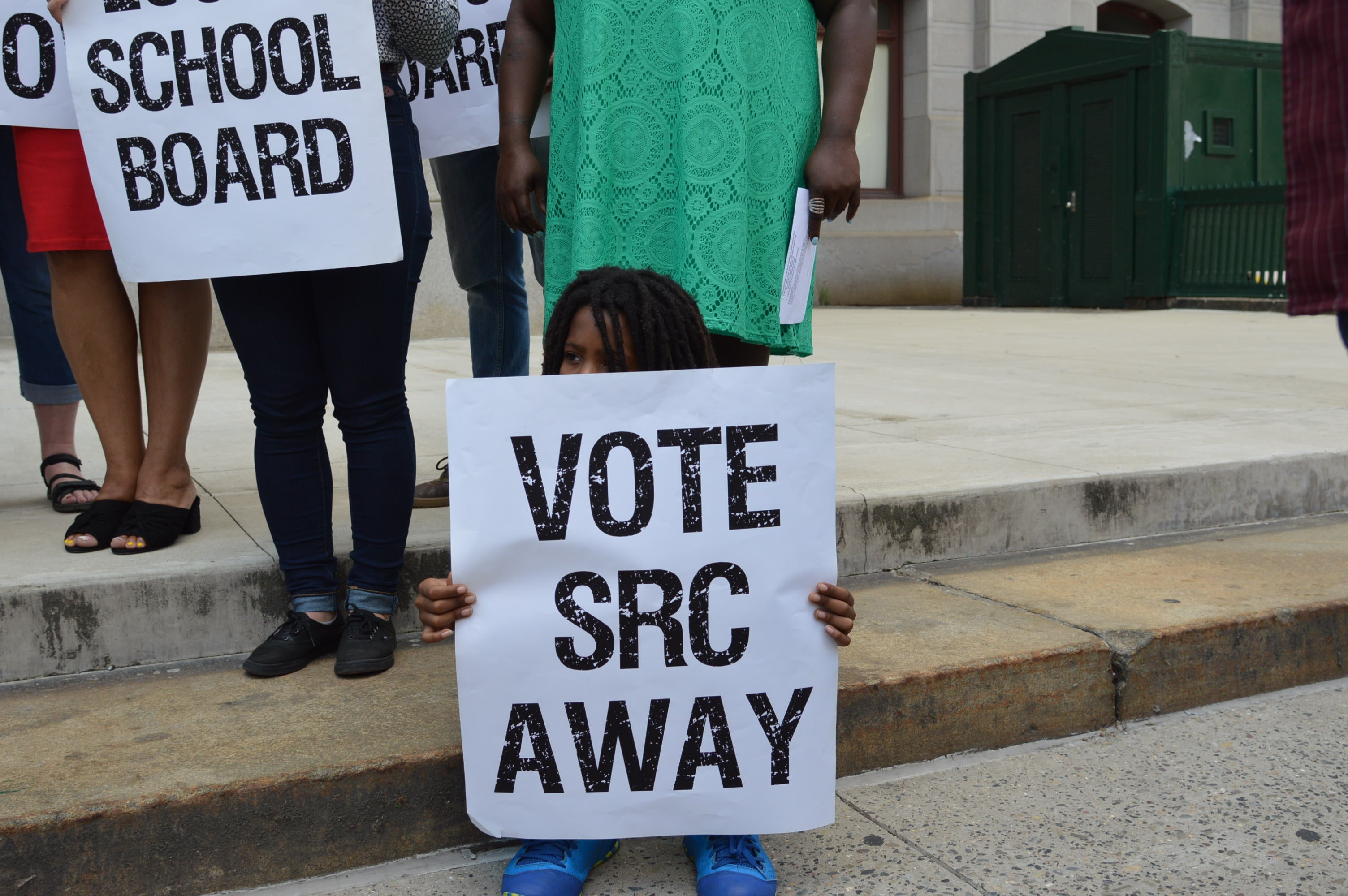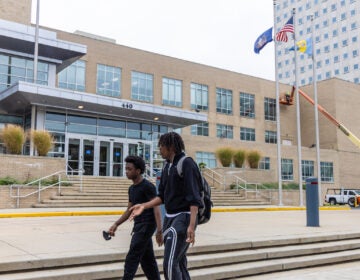Was Thursday the beginning of the end for Philly’s SRC?
Philadelphia’s School Reform Commission heard a presentation on a road map for disbanding itself.

A child holds up a sign at recent rally calling for an end to the School Reform Commission. (Tom MacDonald/ WHYY)
Philadelphia’s School Reform Commission has heard hundreds of presentations over its 16 years, but none as existentially important as the one delivered Thursday by district lawyer Miles Shore.
The topic? How to self-destruct.
Speaking before the five-member panel, Shore explained how the commission could vote itself out of existence.
The commissioners almost certainly knew much of what Shore told them. The significance was that this conversation happened in public, the clearest signal yet that the SRC could soon be replaced by a locally controlled school board.
SRC Chair Joyce Wilkerson described the presentation as “purely informational,” meant to outline the legal considerations regarding the SRC’s potential dissolution.
“The public has been talking around it,” Wilkerson said. “We owe them some indication of what we see as the issues inherent in the decision.”
As Shore explained, a lot has to happen before this bold-but-divisive experiment in state control over Philadelphia’s schools ends.
First, a majority of commissioners have to approve a resolution recommending the SRC be dissolved. After that, the Pennsylvania Secretary of Education, currently Pedro Rivera, would have to issue a declaration formally dissolving the commission.
If Rivera issues that declaration by Jan. 1 — 180 days before the end of the school year — the SRC would be dissolved on June 30, 2018. If the process drags any longer, the SRC would stay in place until June 30, 2019.
“We don’t have a timeline,” said Wilkerson. “We don’t have specific dates. But we’re mindful that if it’s gonna happen at all this school year, it would need to happen by the end of December.”
Why now?
SRC dissolution is a tough political needle to thread, but SRC critics believe they have a shot right now.
Gov. Tom Wolf favors returning the Philadelphia schools to local control. While supporting a return of the District to local control during his campaign, Mayor Kenney has more recently wavered on whether it would be a good idea. Activists have been meeting with him to urge a firmer stance, and his spokeswoman, Lauren Hitt, said he has been carefully studying the issue and talking to various stakeholders.
Kenney has expressed concern over the potential political implications and whether it is more likely to ease the District’s perennial financial woes.
“First and foremost, he is focused on the District’s impending $1 billion deficit — he’s heard from a lot of people and done a lot of research on the topic of school governance and he is still considering all of that — but under any model, the District having a $1 billion deficit is a problem,” Hitt said via email.
A majority of the board’s current member — Estelle Richman, Chris McGinley and chair Joyce Wilkerson — are either Wolf or Kenney appointees. That gives Democrats a solid grip over the outcome of the SRC abolition vote and the declaration process.
If Wolf were to lose his re-election bid in 2018, the forecast for dissolution would look considerably cloudier.
What dissolving the SRC would mean
Shore’s Thursday presentation also covered what would happen after the SRC dissolves.
Absent a change in Philadelphia’s charter, the SRC would be replaced by the body that preceded it: a nine-member Board of School Directors appointed by the mayor. Under the SRC, Philadelphia teachers aren’t permitted to strike, but that provision would also dissipate. As in other Pennsylvania districts, Philadelphia teachers would be able to strike so long as their strike did not prevent the district from providing students with 180 days of instruction.
What would not change is the school district’s taxing authority. Because the Philadelphia school board wouldn’t be elected, it wouldn’t have the power to raise taxes. As it is now, the school district would rely on city and state officials to set its revenue levels.
After Shore’s presentation, commissioners asked a handful of questions meant to illustrate — mostly to the audience —what has been detailed above.
Activists were not mollified. The first public speaker, Samuel Dennis, a student at Science Leadership Academy, demanded a timeline. Wilkerson said that any plan to vote on a resolution would be posted well in advance of a meeting.
Dozens of people stood with raised signs, chanting “tick, tick, tick, tick” to fill out Dennis’ allotted three minutes of speaking time, despite Wilkerson’s effort to move on to the next speaker.
Later, George Bezanis, a teacher at Central High School and member of the Caucus of Working Educators, said that Gov. Wolf was in danger of not being re-elected and that Scott Wagner, a state senator from York running for the Republican nomination, would appoint SRC members who would eviscerate city schools.
Bezanis also derided SRC members Bill Green, who was not present, and Farah Jimenez. Both of them were appointed by former Republican governor Tom Corbett, whose decisions in 2011 leading to cuts in state and federal education aid led to fiscal crises in Philadelphia and other school districts.
“Please vote to dissolve this sham of a school board,” he said.
As an indication of how bitter this issue has become, Jimenez fired back, calling Bezanis a “lazy thinker and orator, who resorts to vitriol and personal attacks. You know nothing about me. ”
Anti-SRC activists say the commission has accelerated the spread of charters and failed to put the district on solid financial footing, despite initial promises that state control would lead to more state dollars.
But others worry abolishing the SRC could create an anti-charter climate in Philly and anger Harrisburg Republicans, who ultimately control how much money the state spends on its public schools.
“That’s a huge concern for us,” said Wilkerson of the district’s monetary woes, which include a projected deficit starting in fiscal year 2019. “We cannot have a stable system of public education looking at that kind of deficit. The gains that we’ve made would be wiped out.”
Wilkerson said the SRC had spoken with several groups about dissolution, but would not say whether that includes Republican leadership.
“I think if it’s going to happen in a way that promotes stability we have to talk with everybody,” Wilkerson said. “So there’s a whole host of conversations I won’t go into.”
•••
By a 3-1 tally, the SRC also voted Thursday to not renew and to revoke the charter of Richard Allen Preparatory Charter School in Southwest Philadelphia, which has been operating for 17 years.
A vocal contingent of parents and students showed up to support Richard Allen, describing it as a caring and successful school. And founder and longtime CEO Lawrence Jones said the charter “was not treated fairly” in the renewal evaluation process.
In a presentation, DawnLynne Kacer, head of the charter school office, said the school lagged academically and operationally, citing a decline in proficiency rates in math, reading and science from 2010-11 through 2015-16.
The school was recommended for a one-year renewal in 2014, but the SRC never acted on it. Richard Allen also briefly expanded to include 9th and 10th grades, partly at the behest of the District, but that proved to be too difficult and those grades have been eliminated.
Jones said that this expansion coincided with the drop in scores as the the charter was operating a middle and a high school at the same time with just one staff.
The school underwent a “self-imposed turnaround” last year, Jones said, but the charter office did not take that into consideration in making the recommendation, he said. And rather than expand as other charters have done, the school plans to stay small to better serve its students.
The vote does not mean that the school will close anytime soon. There is a requirement for hearings before any final vote is taken, and the option to appeal a negative decision to the state. SRC chair Joyce Wilkerson took pains to tell Jones that this vote was just a “first step” in a long process that would not necessarily end in closure.
Several speakers also said they have detected a pattern — that the charters being recommended for closure are disproportionately those run by African Americans and educating mostly African American students, while larger white-run charters stay open.
Gerald Johns, a community member, said that he has done an analysis showing that the percentage of students attending minority-run charters has declined from 32 percent to 14 percent.
Commissioner Farah Jimenez cited this pattern in voting to renew Richard Allen’s charter. While she said that there is “no excuse” for not producing good academics, “it is difficult for me as I continue to see minority-led charters the ones shut down.” She voted to renew the charter, in opposition to her colleagues.
WHYY is your source for fact-based, in-depth journalism and information. As a nonprofit organization, we rely on financial support from readers like you. Please give today.





